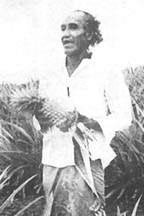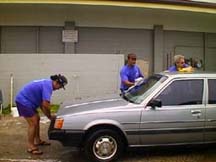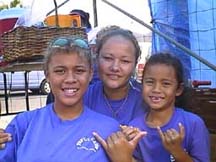|
See
pictures from Rotuma Day Celebration at Ahau, 13 May 1998
Fiji Rotuman living in Queensland receives special award of OAM, announced on the Queen's birthday honours list on 8 June 1998. Vaivao E. John Antonio was awarded the Medal of the Order of Australia (for service to Pacific Islander & Polynesian communities). He is probably the first Polynesian Australian to be awarded the OAM for such contributions. Born and bred in Fiji, Mr Antonio ( 65 & semi-retired) came to and has lived in Sydney (and New Zealand), then settled in Queensland 40 odd years ago and has been involved with youth & community work for more than 34 years.
From the Countrywide Section of Fiji Times (Wednesday , 17 June 1998) Pineapple Prince: He pinned his hope on this crop and never went wrong By Lice Movono He is 64 years old but still going strong. He has five children, all of whom but one went through university and have good jobs. He is from Motusa, on Rotuma but prefers to be called a Fijian from Lomaivuna, Naitasiri.
He has a son who is head of department at a high school, another who teaches in the same school, a daughter who is the only female computer programmer at the Native Lands Trust Board, a son in university and another who helps him manage the family farm. His farm sprawls over four hectares (10 acres) of fertile land. He has been on tbe land for more than more 30 years. He specialises in growing pineapples, dalo and cassava. This seasoned farmer gets to his farm before his family is awake. He takes only two breaks for the day and is back with the family in time for a quick wash before dinner. He is Mua Hereniko, a classic example of a farmer whose hard work is paying off. Mr Hereniko was one of the farmers who took advantage of an opportunity to make use of State land when a Ministry of Agriculture farming scheme was drastically affected by Hurricane Bebe in early 1972. Married with a young wife and three children, Mr Hereniko said it was hard getting a decent job in the early 1960s. After losing his Job with an engineering firm when it closed down, Mr Hereniko said he saw hope after reading an advertisement in the newspaper for would be farmers to plant food crops for export. The advertisement specified crops like bananas, dalo and ginger. Today, Mua has a very successful pineapple farm. The same can be said of his dalo farm. On average he can be guaranteed of a harvest of 60,000 pineapples. Almost all of this quantity is for export. One only has to listen to him talking about his precious pineapple plants to see how important the farm is to him. "These beautiful trees will always bear fruit," Mr Hereniko said. "It's not like dalo and cassava when you harvest. You get rid of the plant and have to plant all over again. With pineapples, when I harvest the fruits, the plants keep bearing more fruit for me." Proceeds from his dalo farm helped Mr Hereniko pay for his children's education. "When my two sons were in QVS (Queen Victoria School), I used to sell dalo to middlemen in Suva. I had to work extra hard on the plantation," Mr Hereniko said. "Sometimes, I keep working until I can't see my cane knife anymore through lack of light." With all his,children well looked after, Mua now farms for the sake of putting money aside for his twilight years. He does not want to burden his children when it comes to retiring. "My children have their own bosses now. They have to look after their own families," he said. When asked about the decrease in the price of dalo on the domestic market, Mua said islanders today do not eat as much as their forefathers. "Before people use to eat a lot of dalo but today they don't really eat so much of it," Mr Hereniko said. "They only buy it when there is a special function or traditional occasion where only dalo can be used. That is why people don't really buy that much dalo." His next project is to expand his pineapple farm by another two acres or so. Like many other farmers in the area, Mr Hereniko is content with the life at Naitasiri where he does not have much to worry about. From Vamarasi Pesamino (17 June 1998) ALOHA ! and Greetings from The Rotuman Catholic Community, Nadi Airport.
On Sunday 14 June 1998, young Catholic girls and boys around the country received their First Holy Communion. At Mount Saint Mary's Parish, Martintar, Nadi, forty-one
children received Holy Communion for the first time, including three
boys and a girl from The Rotuman Catholic Community in the Parish.
They are Justine Hae, Paul Mario, Sefeti Rigamoto and Helen Mario.
They are in Class 4 in Mt St Mary's Primary School, Nadi. I (Va)
and cousin Akata Aisea had lunch with Sefeti Rigamoto and family
at Wakadra. Sefeti is a son of Jiurie & Voi Rigamoto. Jiurie
is from Motusa, daughter of Lijiana & Mua, and Voi is a son of
Maria Makarite & Rigamoto of Kalvaka, Noatau, Rotuma. Their o'o'i, ma
kainaga, came
from Suva for this special celebration. Plenty of food was prepared--koua
rauraut, pork, chicken, fekei,
dalo, palusami, kokonda, salted beef
(fupagmas) & chop suey, watermelon
and pineapples & other fruits, plus cakes and ice-cream, too.
We also celebrated the birthdays of Voi & Sa'a. They are brother & sister,
children of Maria Makarite. We all enjoyed our food. So much lovo
food was prepared, after lunch Jiurie & her mum (Lijiana) shared
the food amongst us, to take home for dinner. Thank you.
On Rotuma Day there was a little celebration held here in Auckland organised by a handful of Rotumans. The Auckland Rotuman Fellowship didn't organise a get-together. Our celebration that week was more a focus on our women-folk preparing their drama for Mothers' Sunday on the theme, "Receiving and Giving." As for the men-folk, the young people and our little ones, there was preparation for a "super morning tea" for our mothers that Sunday. Our little church was packed and we were really blessed by the mothers' leadership. Now that this is over, our focus is on our monthly meetings and "taumaka" for the October get-together and Annual General Meeting of the New Zealand Rotuman Fellowship which will be held here in Auckland. The Cable ship Pacific Guardian has been here since Easter and we have been blessed by some of the members of the crew coming to our community meetings and church services, as well as sharing some meals with us in our homes. My brother Elaijie Tolo and Faga Aisake have been helping our choir with new tunes in "Mak Ka'peli". On the 4th of July all the Saolei people here in Auckland are making a fund raising "fekei" (mara ma 'a'an mara) to sell to our friends and kainaga. The money raised will be sent to Aunty Isapeti Inia and our relatives in Rotuma towards the renovations of the Saolei Methodist Church. We are very happy to take orders from anywhere in the world. Just email me and tell me how many fekeis you want to buy and I'll put you on the list. We are selling the fekei at NZ$ 5 each. Just give us your order and send us your money to help the Saolei Church and we will fax you your receipt together with your fekei and our thank you letter. This is a new method to raise funds for a good cause, using the new technology we have access to today . Good idea, isn't it? Similar to the Telethon system used to raise
funds for hurricane appeals, etc.I can guarantee the quality of the fekei.
I know you've been having fekei mara ma 'a'ana but
this is one step higher, it's fekei mara ma 'a'an
mara. We want to do this for our people of Saolei and Rotuma.
We are waiting with great anticipation to hear from you--our friends, kainaga and
supporters of this good cause--from all over the world.
The Tefui Club held a carwashing fundraiser on Saturday, 20 June, that was lots of fun & helped raise money for a planned group trip to Rotuma in the year 2000. After the work was done we went to Kailua Beach Park for 'a te ma mane'a to celebrate the graduations of Lala Breckterfield from High School and Lance Turanga from Brigham Young University--Hawai'i with a degree in social work. Some pictures:
From Sarote Konrote in Lebanon (16 June 1998) Life in the land of milk and honey -- a mother's experience During the beginning of the first term school holidays (end of April - mid May) I returned again to Lebanon with our sons (Emmanuel and Andrew ) to visit Jioje who had been on his own for most of the time since he assumed command of UNIFIL last year. Emmanuel and Andrew had since returned to school but it was so good to be able to at least spend some time together as a family since their father had been spending so much time away from home. I will be returning home towards the end of the year in order that I can spend some time with the boys before they sit for their final examinations. Although I miss our sons and the rest of the family and kainaga (not to mention the tahroro and ikou), I am slowly adjusting to the daily routine and lifestyle of a peacekeeper's wife in what I consider to be a very dangerous part of the world indeed. I am being reminded on a daily basis about the volatility of the overall security situation by the occasional rumbling (like thunder) of the artillery and mortar fire as the Israelis and their allies exchange fire with the various Islamic resistance (IR) groups across the demarcation line. Sonic booms and high pitched and shrieking jet engine noises made by low-flying Israeli fighter bombers enroute towards Beirut and the Bekaa Valley (between Lebanon and Syria) on bombing missions has been equally frightening. Jioje calls these flights the 'Beirut Express', a typical soldier with his warped Malhaha sense of humour. In the mornings we are often awakened by a combination of the sound of gunfire (Israeli patrol boats exchanging fire with IR coastal positions) and the deafening wailing of Islamic imams summoning the faithful to morning prayers through loudspeakers from mosques in the neighbouring villages. Indeed I miss and certainly prefer a wake-up call by the crowing of roosters as we are accustomed to in Rotuma. We live in a so called seaside 'prefabricated villa' within the UNIFIL headquarters complex. It is surrounded by a 12 foot security wall. One of the first things which I was shown on arrival was a bomb shelter which I hope I will not have to go into during my stay....unfortunately I had to spend sometime in it last week when there was a shelter drill. French paratroopers provide a 24 hours security detail and when Jioje is away (which is most of the time) I feel very much like a prisoner because I am not allowed to leave the compound without his bodyguards. Shopping for our daily household requirements and the many formal luncheons and dinners (including the last luncheon for Fiji's President Ratu Sir KKT Mara and Lady Mara and party which included Col Paul Manueli, the Commander RFMF and High Commissioner in London) was a great challenge. I have been often reminded that I cannot enjoy a daily leisurely shopping trip to the local supermarket because of the prevailing unfavourable operational situation. During the rarest of occasions when the situation permits (only two for the last seven weeks), I was able to travel with armed escorts to the port city of Tyre to buy some much needed groceries, including fresh vegetables and meat. During such forays the escorting soldiers would politely show me how to put on a flak jacket and steel helmet in case we were caught in an exchange of artillery or mortar fire between the warring factions ....not a very comforting thought....and what a marked contrast to the peaceful and serene shopping environment of BPs or MHs in downtown Suva. Accompanying Jioje to some official functions in Beirut or Tel Aviv could be equally unnerving. To avoid travelling throungh Lebanese, Syrian or IR checkpoints and for security reasons he prefers to fly by helicopter to these engagements. Last week he rushed back from Beirut and picked me up so we could fly down to Jerusalem to attend the 50th anniversary commemoration of the formation of the United Nations Truce Supervisory Organisation (UNTSO) which monitors the ceasefire between Israel and Syria up in the Golan Heights. I am not a good flyer so the two hours flight was a nightmare because of the frequent changes to our flight path (altitude and direction) due to conjestion with both civilian and military aircrafts. An unforgettable experience indeed. Back in the residence the telephones are constantly ringing. Late into the nights he would still be consulting with his ADC and the duty officers in trying to resolve incidents or problems which the battations have been confronted with in the field. My incessant enquiries about such problems would be met with a curt but polite 'everything would be alright dear... just keep praying.' A midnight call the other night kept him awake for sometime. Later on he commented that it had been a bad day and whether I had wanted the good or bad news first? The good news was that a Nepalese position had taken a direct hit from a 120 mm mortar round fired by an Israeli backed group and that no one was killed or injured despite extensive damage to buildings and vehicles...the bad news was that prior to the incident a patrol vehicle belonging to the same contingent had tumbled down a cliff during the exchange of fire resulting in the death of two soldiers. Two other members of the patrol were very seriously injured. Minutes later I heard the helicopters taking off to retreive the dead and wounded. It could have been worse, Jioje said, before getting on the telephone to issue further instructions to the duty officer. A typical night in a land where there is never a dull moment. In the morning he was gone and as I sat on my own and listened to the waves and gazed across our verandah to the blue Mediterranean sea I could not help but shed a tear or two because I miss our sons and long for the peace and tranquility of my home village of Maftoa and Rotuma...a paradise indeed compared to this so-called land of milk and honey. We are half a world away from our loved ones and kainaga and it is no wonder that Jioje had just reminded me that he is looking forward to fishing and gardening in Rotuma... for a change. In fact, it is a much better prospect to being the 'meat in the sandwich,' he joked. One day he referred me to the Bible and said with very strong conviction that the answer and solution to all the problems in the Middle East are in the Good Book. I certainly agree with him. I fully understand the enormity of his responsibilities in trying to keep the peace in a region where ethnic and religious conflicts had been endemic for centuries and to share the burden I feel obligated to spend some time with him in the mission area (despite the dangers) before returning home to our sons and family. As a soldier Jioje does not enjoy peacekeeping but he assured me that he would endeavour to serve Fiji and Rotuma to the best of his ability. In this regard may I humbly request that we all pray for the safety of all our troops wherever they are worldwide. I look forward to sharing my experiences with everyone at home and telling them more about the Holy Land (Land of Milk and Honey) on my return. Fu'omus ma hanis ne 'os Gagaj 'Aitu. |



